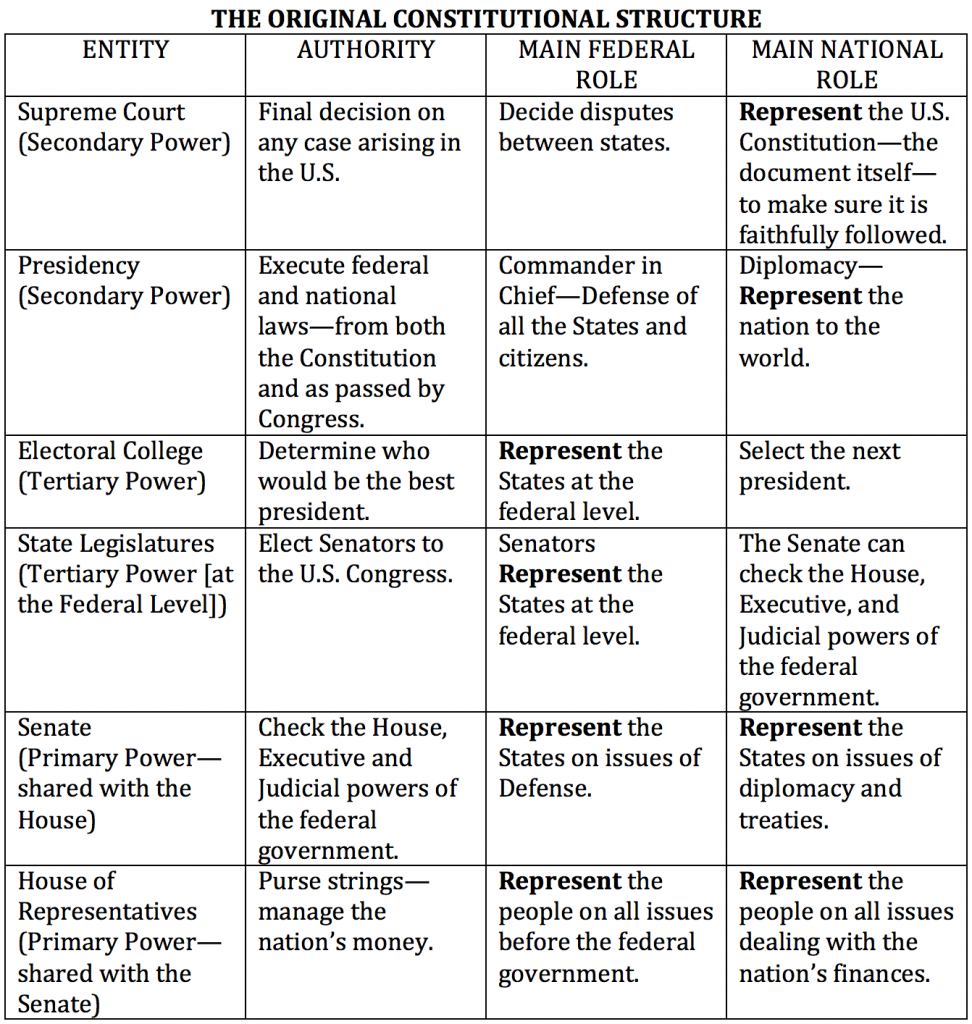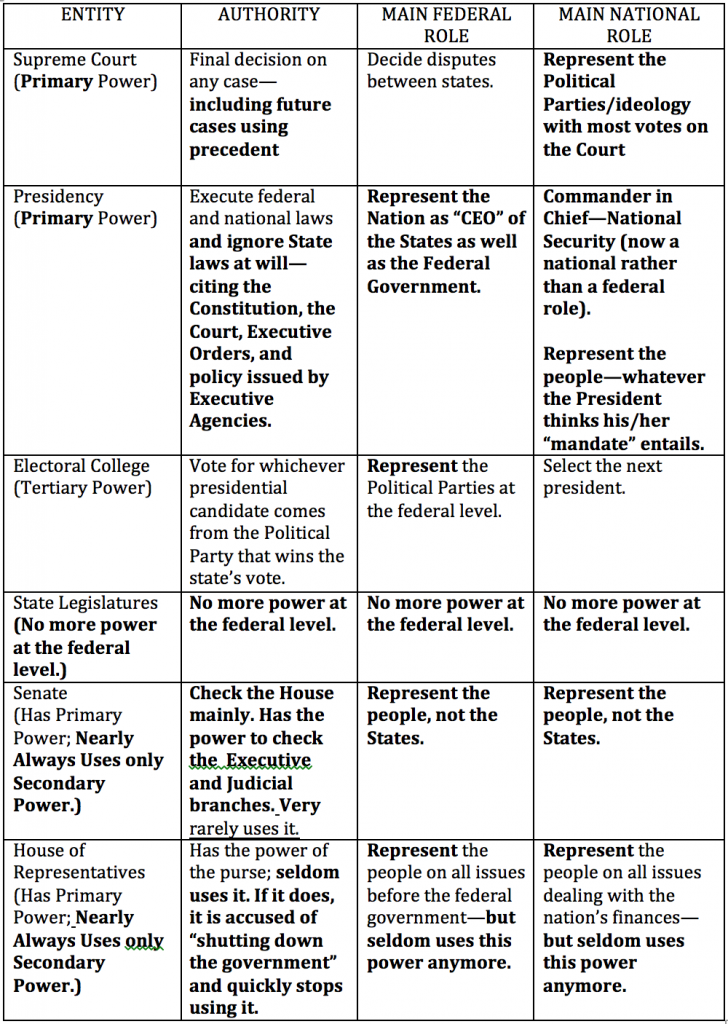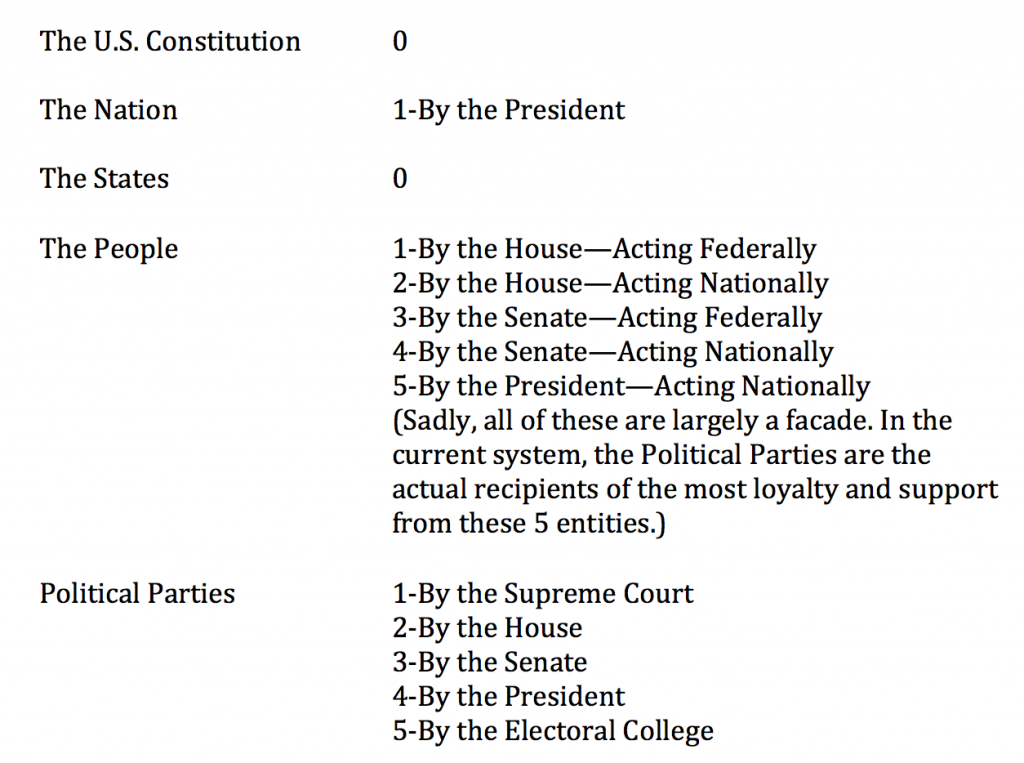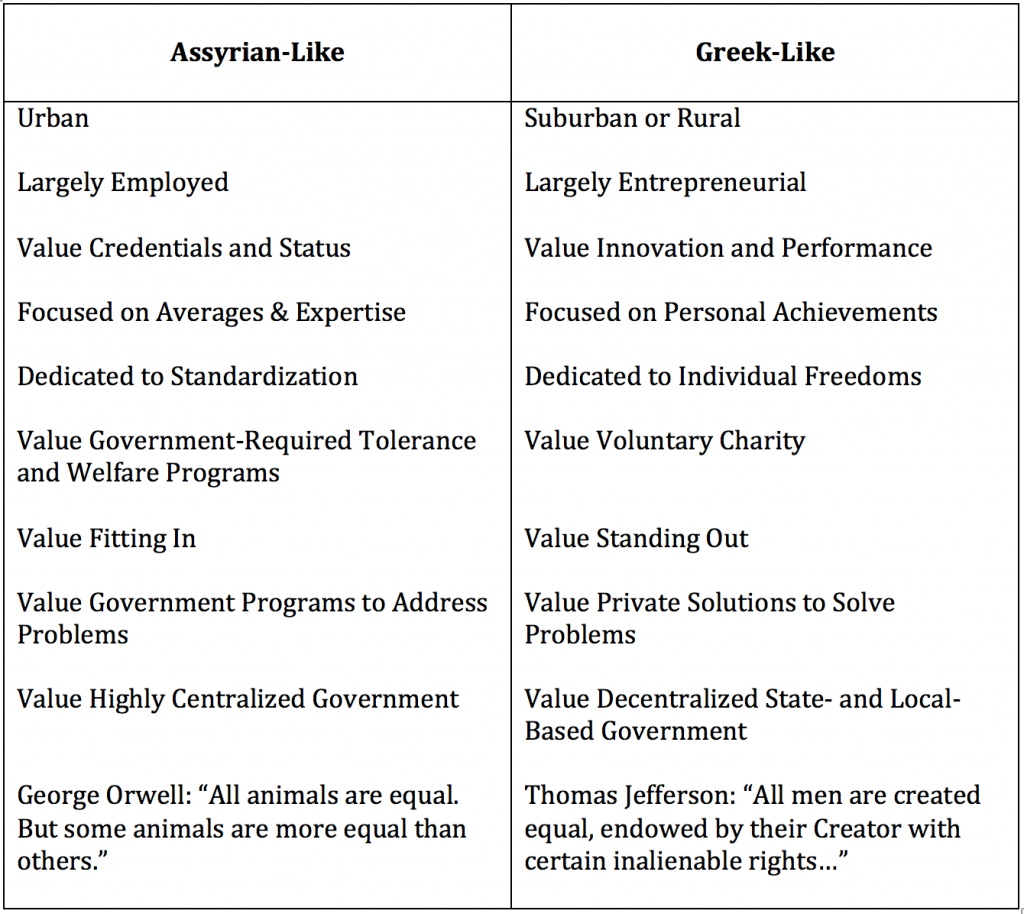Are We Entering an Era of One-Term Presidents?
July 22nd, 2016 // 2:49 am @ Oliver DeMille
Loyalties and Addictions
 Many nations, and the global market as a whole, are moving from the Loyal Economy to an On-Demand Economy. (See Klaus Schwab, The Fourth Industrial Revolution, 2016, 72) This is just what it sounds like. Our societal focus is increasingly on what we want–not what we need, should want, or have already agreed to.
Many nations, and the global market as a whole, are moving from the Loyal Economy to an On-Demand Economy. (See Klaus Schwab, The Fourth Industrial Revolution, 2016, 72) This is just what it sounds like. Our societal focus is increasingly on what we want–not what we need, should want, or have already agreed to.
This shift is impacting work, business, management, leadership, professions, and even families, churches and communities in massive ways. It has already taken a significant toll on relationships in our modern society. Indeed, almost no part of human life has remained untouched by this momentous change.
Just think of all the ways damage can be caused by a shift away from loyalty, and changed to whatever someone wants instead, and you’ve got a pretty good indication of the problem. For example, as a society we have historically been known for being loyal customers—we either love or hate the Yankees, Cowboys, Lakers, etc., and many people have traditionally been very passionate about Ford or Chevy, West Coast or East Coast, City or Farm, New York Times or Wall Street Journal, Prada or Gucci, and so on.
As for Republican and Democrat, these attachments were often multi-generational, and as zealously maintained as one’s religion. For a number of people, these labels (GOP or Democrat) defined “who they really were as people” more than any other feature.
But in the Digital Age we’re losing many of these connections. A lot of people now switch allegiance to sports team based on how the best clubs are playing this season, and we change “favorite” recording artists or television shows almost as often as we change our socks nowadays. We press “Like” one day, and don’t press it the next. Just follow the Twittersphere—changing loyalties is new a national hobby. Or addiction.
The Line
With the endless options of the Internet constantly streaming in front of us, it’s not surprising that many customers—most customers in fact—consistently try out new options. Why not? Maybe the next one will be better.
The same is true of many companies. It used to be that good employees were given numbered pins each year or decade—to show how long they’d been at the company. The ideal was once to work your whole life with one organization, move up the ranks a little or a lot, and retire in the same company and town where you started your first job. The whole company threw a party, and you were presented with a gold watch, an engraved silver pen, or another memento of your long-term loyalty.
Today few companies exhibit such loyalty. Some, in fact, routinely purge upper-level management in order to replace more expensive employees with cheaper, younger models who are decades from earning a pension. The laws have made it much easier to carry your retirement savings with you from company to company, and a lot of people are constantly on the lookout for a better job elsewhere. There are popular apps dedicated to this habit.
Given today’s technology, and the nimbleness big organizations must somehow try to exhibit in order to remain relevant, such changes aren’t surprising. In fact, they may simply be the new way of things, the new normal. The old is always being replaced with the new. This week. In fact, in the news cycle Monday’s “crises” and “tragedies” often go unmentioned by Thursday.
Thus it isn’t shocking that our political leanings are going through an era of upheaval as well. During modern periods of economic and cultural stability, a majority of voters stick with the parties. Whether you like this approach or not, it’s usually the reality. Such majorities may be “silent” most of the time, but on election day they vote like the experts knew they would. They toe the party line.
Parties or Menus
We have seen this kind of stability erode a great deal since 2006. The iconic memory of 9/11, followed by the failure to find weapons of mass destruction in Iraq or win the wars in Iraq or Afghanistan easily and quickly, threw the electorate for a loop, and the Great Recession that followed moved us decisively away from political stability—at least for a while. China, Russia, the Middle East, North Korea, fluctuating prices, an economy that never seems to recover, and so many other things contribute to a growing sense of chaos, and of things getting worse.
Indeed, elections seem to get crazier and crazier. Predictions by the top experts, and the masses of talking heads, are now routinely wrong.
This isn’t driven by a cycle, however, meaning that we can’t chalk it all up to “a phase” the nation is going through before it reverts back to its traditional, normal behaviors. Cycles and trends do sometimes explain things that happen, but this time something more is going on. The rise of nearly-ubiquitious digital mobility is still in its infancy, and it is quickly restructuring politics (along with marriage, family, community, education, career, business, the economy, etc.).
Voters are less and less likely to be Loyalty Voters, emotionally attached to one party that stands for their culture, their beliefs, their family traditions. Indeed, in a world where more and more people are routinely questioning their birth culture and family traditions, they’re not likely to let loyalties based on these things get in the way of change.
Specifically, we are entering a Pragmatic Era in politics, where people want on-demand government. They want a menu of options to choose from, not a political party and its bureaucracy. They don’t really want to choose between candidates. They want a little of what one candidate has, but without the rest of his ideas. They want some of what another candidate promotes, minus his personal views, or his stand on [fill in the blank…]. They like what they hear from one candidate on one day, but disagree with what she says the next.
Response Government
It’s not so much a targeted electorate where the candidates try to win over the biggest special interests—like it has been for the past two decades. What’s emerging now is, to repeat, a growing clamor for on-demand politics. Voters want to unbundle government. They want to be able to select “yes” items and “no” items from every candidate running for high office.
In other words, they want Washington to live in the Digital Age. They want to directly email—or, better still, text—presidential candidates and have an on-going dialogue with them, and then continue the dialogue after the president is elected.
“I liked your speech yesterday at Georgetown, except for the part on naval upgrading. What actually needs to happen is…”
Moreover, they want the President to answer their email.
“Thanks, Amy. I see your point. I’m meeting with the Joint Chiefs later today and I’m going to tell them your recommendation—and order them to do it. They really need it. Good thing you’re on our side and sent me that email.”
Today’s voters want the government to respond the way Amazon does. Immediately. In fact, they want to be able to sign up for the President’s Prime service—free answers within the hour, and nearly-immediate government implementation of whatever you tell the Oval Office to do.
“Get your policy implemented by Tuesday at 8 p.m., if you order it in the next 8 hours and 41 minutes. To get it by Monday at 8 p.m., pay an extra $3.99 and click here…”
As a result of this shift in voter expectations from their government (and the fact that government is still stuck in the 60s–or maybe the 70s–ways of doing things), hardly anyone is truly happy with any election anymore. Presidents Bush and Obama may well be the last loyalty-backed presidents. Indeed, barring a major military threat that unites the nation against a common enemy and brings back a loyalistic approach, most future presidents may well be one-termers.
That’s worth repeating. We may be entering an epoch of one-term presidencies. We’ve already seen the voters moving this way with their seeming schizophrenia in presidential versus Congressional elections. They routinely put one party’s candidate in the White House and simultaneously fill the Congress with the opposing party.
Solutions
Again, what the voters really want is a truly on-demand system, where they can elect national leaders and direct their actions issue by issue, “no” on this, “yes” on that—preferably with a click of their computer—er, smartphone. This is leading in the direction of more democracy, specifically a more democratic system built around online voting. And, honestly, most modern Americans see this idea as excellent, obvious, and overdue.
In response, I have two words:
- Federalist.
- Papers.
If you have studied them in depth, you know exactly what I mean.
But most people haven’t.
And that means we’re in for a wild political ride just ahead. It might contain a series of one-termer presidents (the nation swinging pendulum-like to and fro, then back again, over and over), a serious party shakeup with a new dominant national political party (or two), or it might be something even more surprising.
Whatever is coming, there is a widespread sense that it’s big. And we don’t even have Steve Jobs to walk out on a black stage in his black t-shirt and announce the future. If he were still around, he’d tell us to hold on to our hats, because this flight into the Era of populism, globalism, voter pragmatism, and digital-age on-demand revolution is just beginning. And the only thing we know for sure is that it’s going to get bumpy.
(Solution: It’s more important than ever for regular people to deeply study the core principles of freedom! The politicians and “experts” aren’t going to fix this for us—they’re the ones piloting the current chaos. For a beginning reading list of core freedom principles—and audios to go with each— join Black Belt in Freedom)
Category : Aristocracy &Blog &Citizenship &Community &Constitution &Culture &Current Events &Education &Featured &Foreign Affairs &Generations &Government &History &Independents &Information Age &Leadership &Liberty &Mission &Politics &Producers &Statesmanship &Technology
Why Populism? by Oliver DeMille
July 6th, 2016 // 7:46 am @ Oliver DeMille
Pendulum Swinging
 We’ve heard a lot about populism during the election, and we’re going to hear a lot more. Why? Because the elite media is in serious shock.
We’ve heard a lot about populism during the election, and we’re going to hear a lot more. Why? Because the elite media is in serious shock.
They expected Hillary Clinton’s success, but the rise of both Trump and Sanders has astonished them.
Result: they’re writing and talking a great deal about “populism,” and the “dangers” it brings to our nation.
By the way, these tend to be the same journalists and media professionals who consistently tout the United States as a “democracy,” not a “republic” or “democratic republic.”
They promote “democracy, democracy, democracy” as the greatest governmental system ever, and then act shocked and worried when populism shows up to an election.
The irony is that populism is simply what happens when more voters than usual get actively involved in the process. In other words, America engages in populism during the years it acts the most democratic. Why are the elites concerned?
Answer: They like the kind of “democracy” where the masses are consistently swayed by the media—where expert elites tell the populace what to believe, and the electorate votes accordingly. This is what most members of the elite class actually mean when they use the word democracy.
Personally, I like Francis Fukuyama’s definition. He said:
“‘Populism’ is the label that political elites attach to policies supported by regular citizens that they don’t like.”
Funny how that sentence is written. Does is mean the political elites don’t like the policies? Or that they don’t like the regular citizens? I think it means the latter. But maybe not. Perhaps it means both the policies and the regular citizens.
Fukuyama notes that populist voters sometimes choose poorly, but “elites don’t always choose correctly either.” Very true. And in our current historical context, the worst-case scenario would be another elitist choice for president. Elites have increased in power far too much in the past three decades, and it’s time for the pendulum to swing back to the power of the people.
I. 3 Positive Developments
Here’s the “good news,” so to speak, about the current rise of populism:
#1
As Fukuyama also pointed out, this wave of populism is weakening both of the major political parties. The Democrats are losing large segments of their working class base and moving even more to the party of “a bunch of special interest groups,” while Republicans are almost violently split between the “big business crowd” and working class voters. Indeed, working class populists from both parties are now behaving like a formidable force.
#2
On a structural note, the framers of the U.S. Constitution didn’t want the president to be elected by mass vote. This is why they established the Electoral College—which originally worked with each state sending its representatives, rather than the people voting in a mass presidential election at all.
Fortunately, the people usually sense it when things are out of kilter. The framers put the people in charge of electing the House of Representatives in large part because the House controlled the nation’s money. But since the House seldom uses its power of the purse anymore like it should, and the White House now has the de facto say over money, the people are using their power to choose a president—like they once would have selected members of the House.
This structural shift if ironic: The masses, divided by congressional district (which is exactly how they oversaw the purse strings under the original Constitution), will select the president and largely determine the future spending of our nation. In other words, if the House shirks its job, the people switch their populism to the branch of government they think will do their will.
The elites see it happening, and they can’t stand it.
#3
Maybe that’s the best thing about this election. Regardless of what you think of Sanders or Trump, both candidates have thrown a serious wrench into the way elites view the world. They are reeling. They aren’t in charge of this election like they assumed they would be—not so far, at least.
Make no mistake, they’ll get their bearings again and get back to their agenda—to grow government and increase the power, wealth, and influence of the elite class. They always do. This won’t keep them down for long.
But populism seems to be growing. Sanders and Trump didn’t create this momentum, they just benefited from it. Populist elections changed the power of Congress in 2010 and again in 2014. In 2016 we’ll find out if populism makes it to the White House as well. Again, however you feel about the specific candidates, the rise of populism is a positive in a nation where elites control far too much.
2: A DEEPER LOOK AT THE CONSTITUTIONAL STRUCTURE (THEN VS. NOW)
To see just how populism is important, let’s delve a bit deeper into the structural change to our governmental system. The framers established the following three branches and six entities to participate in the federal level:
Note that the following received direct representation under the provisions of the original Constitution: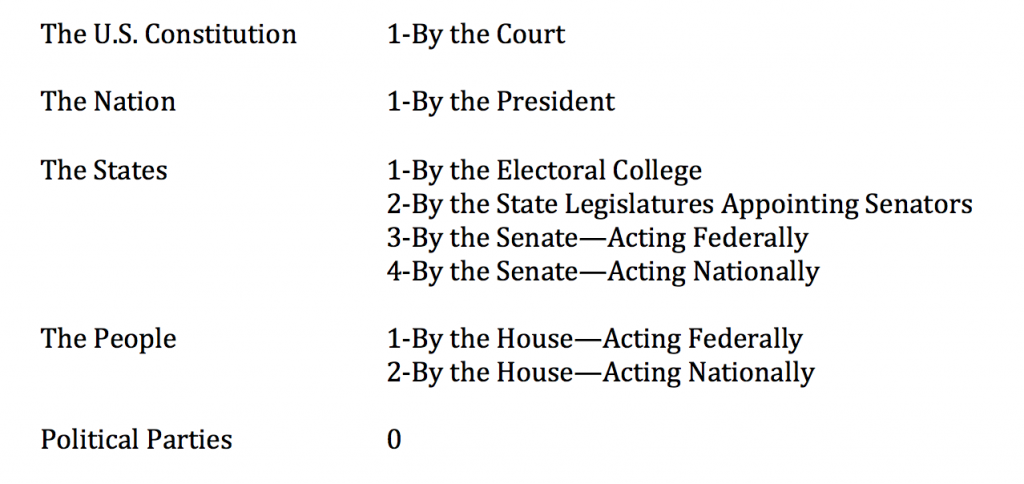
This entire arrangement was carefully thought out by the framers. They knew that the key to lasting freedom was to ensure that the States didn’t lose their power to the federal/national government, so they put in four protections against this (listed above). All were wiped out by the poor decision to adopt the 17th Amendment in 1913. (Ironically, this was ratified during an era of populism.)
Our oversized and overblown national government and corresponding loss of freedoms since that time are the natural result. The best solution would be to repeal the 17th Amendment and restore the proper balance of State and Federal powers.
The following chart shows how the government currently operates. Note that it is very different than the original constitutional arrangement:
THE STRUCTURE TODAY
(Items underlined are changes from the original Constitution
that are destructive to freedom.)
Look at how this has changed our governmental structure of representation:
Did you notice in all this that at the time of the American founding the primary entities of federal/national government were the House and the Senate, while the Court and Presidency were secondary? Compare that to now: the Presidency and Court act like primary branches of government, while the House and Senate act like secondary levels of government.
What the founders called “legislative primacy,” meaning that the people’s elected representatives in Congress had the final say on things through the purse strings, has been replaced by appointed officials in the Court and a huge Executive bureaucracy exerting the final say on most things.
Huge changes. All bad!
For The People
Now, if you’ve followed this article this far, congratulations! Here is the main point, the thesis, the reason for reading this and thinking about it:
Populism is attempting to correct the course of the American ship. Specifically, the populist elections of 2010 and 2014 both attempted to put the House and Senate back on track representing the people—not the political parties.
And the populist uprising of 2016 (among both Democrats and Republicans) is also arguing for the presidency to represent the people again, not the political parties. It’s not as good or as effective as repealing the 17th Amendment—not by a long shot—but at least the electorate is trying.
The voters (some knowingly, and most of them just by following their gut) are attempting to swing things back in the direction of government “by, of, and for” the people—instead of government “by, for, and of” the economic and power elites and their political party establishments.
Populism probably can’t get the ship all the way safely into port, but right now the people are at least trying to get things going in the right direction. If the voters keep at it, and don’t give up—and if they keep winning major elections—this new beginning can eventually be turned in the direction of a real and lasting solution.
Stay tuned…
Category : Aristocracy &Citizenship &Community &Constitution &Culture &Current Events &Economics &Education &Entrepreneurship &Featured &Foreign Affairs &Generations &Government &History &Independents &Information Age &Leadership &Liberty &Politics &Statesmanship
The Recurring Topic of Equality by Oliver DeMille
July 6th, 2016 // 7:15 am @ Oliver DeMille
(Note: In the Internet Age, writing short blog posts usually wins the day.
“Nobody wants to read more than 1-2 pages,” the experts say. “Less is more.”
I usually try to follow this maxim. But today I’m making an exception.
So be forewarned: This article is quite a bit longer than usual, and I feel that
every word of it is worth reading! Enjoy…)
I.
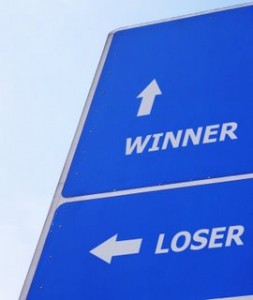 Free enterprise isn’t perfect. But the most popular alternative proposed in human history—equality—isn’t either. Neither of them bring full justice or fairness to society.
Free enterprise isn’t perfect. But the most popular alternative proposed in human history—equality—isn’t either. Neither of them bring full justice or fairness to society.
The truth is, freedom has a lot of problems. Still, humankind hasn’t come up with anything better than freedom as the guiding societal arrangement—and so far in history the many human attempts at creating lasting equality have brought disaster after disaster.
Here’s why: Life isn’t fair. And life isn’t just. There is unfairness and injustice in every era of history—in every nation and time period. A world that is entirely just and fair simply doesn’t exist—and has never existed—among humans.
Even in an ideal society, whenever that comes (and I believe it can and will come), there will still be unfairness. Just like there is unfairness in every family, every business, every friendship, every marriage, every relationship, every church, every group of humans anywhere.
No exceptions.
To repeat it one more time: If it’s human society, then human nature is at play, and therefore there will be injustice and unfairness. Period.
II.
Of course, people don’t like this reality, so all through history we’ve tried to change it. Some people attempt to fix this frustrating reality with more “freedom,” but it doesn’t work. Not perfectly. So they try to fix it with more “equality,” but that doesn’t work either.
They try to fix it with increased government regulation, intervention, and oversight, and guess what? There is still injustice and unfairness. In fact, such governmental attempts nearly always increase the amount of injustice and unfairness.
Here’s the reality:
- The problem with freedom is that it always ends the same. In a free society, an elite economic class eventually rises and dominates the regular people. Without government controls to keep those who succeed in the market from becoming too big and powerful, elite economic classes always take over.
- The quest for equality is also problematic. In a society seeking equality, an elite political class always rises and dominates the people. If there isn’t a level of economic openness that truly allows anyone to rise economically, and to rise as far and as big as they choose (as long they don’t violate anyone’s inalienable rights), a few elites always use government power to keep certain people from competing in the marketplace—and this results in even more inequality.
If you like the allure of “equality,” read Item #2 over and over until it makes sense. It is, literally, the history of almost all human societies.
If you love freedom, read Item #1 as well. It’s very important to understand this reality. (See, for example, Federalist Papers 1, 2, 10, 14, 15, 18, 19, 20, 51)
III.
The American framers knew this history, and they tried to find a middle ground. They hoped that by separating powers and further checking and balancing the forces of government, they could keep the elite economic class working in the Senate and in the Executive branch, and the elite political class busy in the House of Representatives and the Court—all fighting each other. Fighting enough, in fact, to keep both elite groups too busy to dominate the regular people.
The framers’ plan worked and it failed. It worked because it improved the situation from what it had been before. The branches of government do attract much of the attention of the elite economic and elite political classes, and they do fight each other—a lot. Enough, in fact, that they dominate the regular people less than before the Constitutional system (for example, compare the English system from 1078 to 1894, and the Continental model from 1530 thru 1915).
But the Constitutional system failed too—because both elite classes still spend some of their time dominating the regular people. Result: we live in a society that isn’t fair, and is often unjust.
Did the founding model improve things a bit? Yes. Demonstrably so. Did it entirely fix the problems of unfairness and injustice? Not even close. But it did better than any of the societies aiming for equality—just look at Russia, China, Cuba, Nicaragua, all of Eastern Europe between 1945 and 1989, and nearly all of Western Europe after the 1960s.
The elite economic class and the elite political class are still growing, and still inflicting their various agendas on the rest of the people. Thus our modern world: Not fair, not just. Also: not particularly free, and not very equal.
IV.
To understand this more deeply, compare the two groups as they currently operate in the United States. The elite economic class (largely Republican) is trying to convince everyone to support it by calling for “freedom,” “liberty,” “capitalism,” and “free markets.” It uses these phrases and slogans as catchwords for its real agenda: “Let’s use economics to increase our power over the elite political class.”
The elite political class (mostly Democrats) does the same thing. It uses terms like “equality,” “social justice,” “democracy,” “fairness,” “higher minimum wage,” “free college for everyone,” and so on to promote its actual agenda: “Let’s use government to increase our power over the elite economic class.”
In all this, here’s the thing that everyone who wants to avoid being swayed or manipulated by the spin machines of either side needs to understand:
Both groups—the political elite class and the economic elite class—win when they keep their message complex. They both lose when the regular people understand very, very basic principles of freedom and fairness.
As a result, they both put a lot of money and resources into influencing academia, the media, the professions, and the entire upper middle class.
Let’s get specific. When anyone argues for “equality,” you have to move it out of the realm of complex, academic, deep, intellectual, and expert, and into the realm of very, very simple. The same is true when anyone argues for “freedom” or “free” markets, etc.
If you’re in a place of complex, the elites are winning. If you get to very simple, extremely basic, the regular people might win.
V.
So how do we take complex “equality” and complex “freedom” and make them truly simple? The answer is easy. Just know the following two definitions of “equality”:
- Equality of Opportunity. Everyone has the same opportunity before the law, meaning they can do whatever they want as long as they don’t violate the inalienable rights of any other person. And this has to be simple, not complex! Meaning: people can do anything, as long as they don’t violate someone’s inalienable rights. This might sound like too much freedom to the intellectual crowd, but the regular people get it. It works.
- Equality of Result. The government tries to make sure everyone has the same results—a generally similar level of income, similar levels of ownership, similar levels of wealth (or poverty). Or, failing to obtain this, they settle for enforcing limits on how much any business, person, or family can own or grow—to try to keep everyone at least somewhere near the same level.
Anyone who argues for Equality of Opportunity is likely on the side of the regular people. They want things to be simple: A government that protects us from foreign invasion and local murderers, rapists, and thieves—and does nothing else at all.
That’s simple: nothing else at all. Protecting inalienable rights, period. And doing nothing else.
Go beyond this, and you’re into complex. Seriously: Any fudging of this moves society into complex, where the elite classes can step in with their experts and intellectuals and take charge.
Again: The simple approach wants government to allow people to do whatever they want, and own whatever they choose to earn, as long as they don’t violate anybody’s inalienable rights. Period.
In contrast, the forces promoting Equality of Results usually want either the elite political class to win, or the elite economic class to win. The political elite class dominates the regular people by using government to regulate, intervene, and keep down the power of the wealthy elite—or so they say. But in all of history this has never once actually happened.
What happens in real life is that elites promising “equality” and “fairness” get elected or appointed to power, and then they and their friends use their position and influence to rig the system so they end up keeping more of the money and power for themselves. This is what has happened every single time. No exceptions.
Literally—there are no exceptions in history. No matter how good the theory of equality and fairness may sound, nobody has ever done it in a lasting way. Some have gotten close—but within a few years it broke down. Always.
Always!
But that’s not all. If the economic elite class dominates, it does the same kind of thing. It promises the people that it will keep the political elites from dominating, and then once it is in power it works to rig the system so it can dominate the regular people. Again, this is how it always works.
This bears repeating: There are no lasting exceptions in all of recorded history. It always ultimately turns this way, as long as either of the elite groups (political [Left] or economic [Right]) have the power.
The only time it doesn’t happen this way is when the regular people maintain the majority of the power—by keeping the government protecting inalienable rights, and doing absolutely nothing else. This creates a true Equality of Opportunity. But this is a very rare situation indeed.
It happened briefly—for some of the citizens—in ancient Athens (the Solonic era), for two short periods during the ascendance of Rome (see the Gracchi and the Aurelian eras), during the Saracen golden age and later in the Swiss Vales period, during the Frank and Anglo-Saxon golden ages, after the implementation of the Magna Carta and again after the English Bill of Rights (but only for aristos), and after the American Founding (but only in the North and West, and only for some of the population).
Again, it is rare.
We don’t live under such a system today. We are firmly dominated by the economic and political elites, and their battles with each other. They both claim to want to put the power in the hands of the regular people—but they never do.
Those calling for equality and freedom mostly want Equality of Results—either led by political elites (Democrats) or economic elites (Republicans). Neither of these ultimately promote the interests of the regular people. If they call mainly for “equality,” “fairness,” and “social justice,” they are nearly always political elites vying for ascendancy over their Republican enemies. On the other hand, if they call for “freedom,” “capitalism,” and “America first,” they are nearly always economic elites seeking to beat their Democratic foes.
People who are convinced by their slogans, catchwords, well-compensated intellectuals, and candidates are routinely disappointed, year after year after year.
VI.
Again: focus on the most basic principles. What we want is Equality of Opportunity—which is what government was created for in the first place. Jefferson outlined this very clearly in the Declaration.
This means simply that we want our government to protect Equality of Opportunity for everyone (strong protection against invasion, and violations of our inalienable rights—period), and do nothing else. Nada. Zero. Zilch.
A government that does anything else—whether in the name of “equality” or “freedom”—always ends up working for one of the dominant elite classes, or both.
So the next time someone tells you that we need more “equality” or “freedom,” find out what they mean. If they mean Equality of Opportunity, great. If they mean something else…one of the elite groups, intellectuals, writers, experts, or apologists have been bending their ear. This may seem too simplistic to some intellectuals—but it is true nonetheless. (For example, very closely scrutinize Federalist Papers 1,15,31,47-49,62 and 70.)
When government protects everyone from foreign attacks and domestic infringements on our inalienable rights—and does nothing else—we’re in the freedom zone.
Everything else done by government is an assignment from either the political elites or the economic elites, and their agenda is to keep the regular people in submission. Fact: they’re good at this game, and they’re still winning it.
VII.
One more thing. Understanding the historical roots of the idea of equality is very important. The word equality came from the ancient Greeks, and they meant something precise. Something specific. “Equality” was holding the same status before the law. But what does this phrase actually mean?
Well, for example, small landowners were “equal” with wealthy landowners, even if the wealthy owner had 100 or even 1,000 times the amount of land and wealth. (See Victor Davis Hanson, The Other Greeks) How could they be considered “equal” in such circumstances? Answer: on their land, their own private property, they had the final say. They couldn’t do something to somebody that took away that person’s universal rights, but they could kick that person off their land simply by choosing to do so.
It was their land. They actually owned it. Entirely. If the wealthy landowner with many thousands of acres came on the property of the subsistence owner with just ½ an acre—the small owner was in charge. Period.
They were equal—because on land one person owned, he had the power. And they both had this power, each on his own land. The law backed the owner up on this, even if the person losing a dispute was the very wealthy owner. If he was on the small owner’s land, the small owner was the boss.
Equal.
And vice versa, if the small owner, or anyone else, went on the big owner’s land.
This is where the concept began. “A man is the king of his own home.” All men are thus equal.
Note that there is no forced equality here. Only enforced equality. The difference is important. Jefferson put this exact concept in eloquent terms: “endowed by their Creator…” In other words, the big and small owners were equal because “Nature and Nature’s God” made it so.
They didn’t become equal because of some act of government, and they weren’t granted equality by some government decree. Instead, they were born equal, regardless of government. The government didn’t force equality—it had no right to do so in this worldview.
It could only enforce the equality that was already there, put there by “Nature and Nature’s God.” Put there by an endowment of the Creator, to cite the Declaration of Independence.
Furthermore, “equality” in this sense was inalienable. It was given to all men equally by birth, by the Creator. It was to be enforced by government, never forced by government.
In contrast, the type of equality we usually talk about today—always on the political Left, and even frequently on the Right—is the kind of equality that government forces. Government wants people to be equal, so it sets out to legislate it, or decree it, or adjudicate it so. This is force, pure and simple.
VIII.
Any time we see real Equality of Opportunity, we’re ultimately just talking about two owners each being the boss on his or her own land or home. When government tries to force equality, in contrast, it nearly always aims for a totally different kind of “equality”—not the kind that came from ancient Greece, but the kind that came from Assyria. In the Assyrian model, the King divided land “equally” among his subjects. They were “equal” in the sense that the King gave each subject what they had. Their ownership came “equally” from the same place—the government.
But this kind of equality is a poor counterfeit of the Greek version. Indeed, in the Assyrian approach, the King kept most of the land for himself and his relatives (royals). He typically maintained another big portion for his close friends and allies (aristos). Honored soldiers received the next level of “equality,” and the rest of his subjects got what was left over—according to the whims of the King.
Call this “equality” if you want, but it’s actually a totally different thing. It’s not even equality at all, even though it still passes for it in most intellectual circles today.
When Marx and Lenin promoted modern socialism and communism, they gave great wordplay to the Greek type of equality—and yet every system set up based on their template implemented the Assyrian structure. No exceptions.
IX.
Indeed, the early Greek meaning of “equality” developed during the pre-polis era. (Ibid.) When a lot of people left the farms and built up the early city-states (city = polis), this model changed. While the small landowner and the large, wealthier land baron still followed the traditions of equality (“If I am on your land, you are the boss, and on my land, I am the boss, regardless of how much land each of us owns—thus we are equal…”), the new aristocratic management class in the polis soon saw itself as superior to the farming “hicks” of the countryside.
The cosmopolitan bureaucrats owned no land, in most cases. So what was their status? They saw themselves as above the rural farm-based regular citizens of their society, and they began demanding special tribute to themselves. They didn’t ask to be treated as equals, but as superiors. The small and large landowners still believed in equality, but they found themselves dealing with an Assyrian-based urban aristocracy/bureaucracy that demanded taxes and titles—above that of all the landowners.
The polis-era landowners responded by arguing for equality—for everyone, including small landowners, big landowners, and the new class of urban managers. The urban elite, of course, rejected this idea—it would have made them equal in title and status with the nation’s “hicks.”
The urban aristos, however, had a problem when they adopted this new model. Sadly for them, they depended on these very “hicks” for all their food and sustenance. What to do?
Answer: They went with the Oriental approach, the Assyrian/Indian/Chinese model. They adopted monarchy. They argued that Kings and Queens would protect the whole nation better, and since the urban aristos ran most city-state governments, they were able to win the support of the urban working masses. They used “democracy” to support kings and queens who they promised would take better care of everyone.
The people who lived under the older system of pre-polis “equality” soon lost both their freedom and their equality. When they complained, they were informed by the urban aristocratic class that freedom meant having the honor of serving the King in whatever way he demanded, and equality meant accepting whatever station and ownership (if any) the King deigned to hand out to you. This pattern repeated across the Middle East, Near East, and West. (See Plutarch, Parallel Lives…; Will and Ariel Durant, The Story of Civilization; Arnold Toynbee, A Study of History; Hugh Nibley. Ancient State.)
Of course, the old crowd disliked this new approach. But the new, self-proclaimed “civilized” states had a name for the old landowners and their widespread freedoms and equality. They called them “barbarians.” In England the term was “boors,” and in America it was “hicks” or “clods,” as Victor Davis Hansen reminds us. (Op cit., Hansen) President Obama exemplified this attitude when he mentioned that too many Americans cling to their guns and religion. He might as well have openly used the word “hicks.”
The connotation (from ancient times to Obama) was that those in the big cities were smarter, better educated, wealthier, and in positions of power—while those in the “sticks” were less intelligent, less educated, less prosperous, and boasted few official titles of nobility.
Remember what the word “nobility” meant: “One who receives his position, status, title, lands, ownership, and assignments from the King.” For their part, the landowners (big and small) rejected nobility. They hated the idea. They wanted ownership: which for them translated to equality and freedom.
X.
Fast forward roughly two thousand years. Today, the two major models of equality have the following characteristics:
Note that both national parties—Democrat and Republican—are dominated by majorities who largely ascribe to the Assyrian values. Those who prefer the Greek principles are in a minority in both parties. They have higher numbers among independents than in either party, however; mainly because independent status by its very nature appeals to people who value standing out and emphasizing their individuality.
Again, original roots of both freedom and equality come from the same place—the pre-polis view of ownership, and of equal status and inalienable rights given to us by “Nature and Nature’s God.” This is the model the American founders adopted—Greek, not Assyrian.
The Assyrian approach has the King or other government—whatever it is—doling things (and rights) out to the people, telling them what they can and can’t do. The Greek approach is different. It maintains that “Governments are instituted among men, deriving their just powers from the consent of the governed.”
These exact words by Jefferson are perhaps the best summary of Greek equality (pre-polis) ever written. Specifically: the people are equal with each other, and they are, together, above the government. Unconvinced? Try this: “That whenever any Form of Government becomes destructive to these ends [What ends? The ends of: “Governments are instituted among men, deriving their just powers from the consent of the governed.”], it is the Right of the People to alter or abolish it, and to institute a new Government…”
The Declaration goes on and on—spouting one pre-polis Greek equality/Greek freedom viewpoint after another. Remember, this all started with: “…all men are created equal…”
“Equality” as it is used in the Declaration means pre-polis Greek equality, not aristocratic/bureaucratic-rule equality. They are very different.
 Finally, to repeat: the American founders got their views of both equality and freedom from the pre-polis Greeks (who got it from the Hebrews—but that’s another article). It was the same culture. Same values. Today we usually just call it the culture outlined in the Declaration of Independence.
Finally, to repeat: the American founders got their views of both equality and freedom from the pre-polis Greeks (who got it from the Hebrews—but that’s another article). It was the same culture. Same values. Today we usually just call it the culture outlined in the Declaration of Independence.
Because that’s exactly what it is. Including:
- Equality of Opportunity.
- Freedom of the regular people.
- Government only protecting inalienable rights—and doing nothing else.
- Not a society run by either the economic elite or political elite classes.
The Declaration had it right: real equality means pre-polis, “Nature and Nature’s God” equality—which also means freedom.
The truth is, we should give it a try sometime…
Category : Aristocracy &Blog &Citizenship &Community &Constitution &Culture &Current Events &Economics &Education &Entrepreneurship &Featured &Generations &Government &History &Leadership &Liberty &Mission &Politics
IT’S TIME FOR A GAME-CHANGE
June 21st, 2016 // 6:55 am @ Oliver DeMille
How to Make This Election Awesome!
The More Important Question
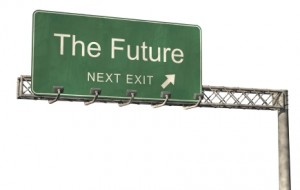 IT’S TIME. Time for a big change in the 2016 election. After all, it’s pumping a lot of negativity into our nation. Night after night on the news, day after day in social media—so much negative, negative, negative.
IT’S TIME. Time for a big change in the 2016 election. After all, it’s pumping a lot of negativity into our nation. Night after night on the news, day after day in social media—so much negative, negative, negative.
Let’s be clear: this kind of energy is not really helping us. Whatever happens on election day in November, it’s going to take a long time to undo all the harm caused by the toxic campaigning and media during 2015 and 2016.
A society that is constantly focused on problems and name-calling tends to generate more problems. As the old business proverb tells us: “What we focus on, grows.”
So let’s ask ourselves a better question:
What can we as citizens do to drastically improve our nation right now?
Cost or Power
It would be nice if something as simple as voting every two years in a national election would fix our nation. But if that truly worked, things would be a lot better by now. Yes, elections do matter. But there are other things that matter even more.
May I suggest three.
These simple things can make a huge difference. More than any election, in fact. Seriously. Here they are:
1: Start With You.
First, when was the last time you did something to greatly improve yourself as a voter? Really? Voting is good, but making yourself a much better voter? Priceless. It truly is. To do this, I challenge everyone to read The Law by Frederic Bastiat right away. It’s short. It’s easy to understand. It’s fun. (It’s also easy to find online, or on Amazon.) [There’s even a wonderful treatment of the content by my friend Connor Boyack – just for kids! Get it here.]
Just sit down and read it for fifteen minutes. By that point, you’ll have all you need—you don’t even have to finish it if you don’t want to.
This one small action will make anyone who does it a much better voter. If you’ve already read it before—once or a dozen times—do it again. In fact, I think every voter should read it the week before going to the polls. Every election. It’s that powerful!
I’m not kidding. This is something truly impactful you can do that will make a significant difference—for you, and for America (or whatever nation you live in!).
2: Pass It On.
Pass this challenge on to everyone you know who cares about America and freedom. Get them reading Bastiat right now as well. Everyone. All your friends and connections.
This will have a major influence on the future.
Take a few seconds right now and pass this on! America needs this! We need Bastiat. Right now…
A nation’s true character isn’t determined by politicians. Our genuine nature is actually the result of what our citizens do. With all the negative energy of the 2015-2016 campaigns swirling around our country, it’s time to add something else to the summer! Something better. Something uplifting and positive. So here goes:
3: Pay It Forward.
Look around in your family, your community, your place of work, the people you know—and find one person who needs something. And just help them. Don’t ask for recognition. And do it free of charge. It might be as simple as being a friend. Or saying something nice to someone who needs to hear it. Or donating twenty minutes of your time to help a neighbor.
Our nation needs more of this type of positive energy right now. And if just the people reading this blog do something nice—even a little thing—for one person in the next few days, it will add some real positivity and honor to our society.
Like I said, we really need it right now. If just a few of us do it, our nation will be better for it. Little things can bring so much positive energy—especially when we’re talking about caring and loving people and helping just a little bit more.
These three things may seem small. But they’re not. They’re big!
Again, we really need more positives right now in our nation—an antidote to help counteract all the toxicity in the media. And it costs us nothing. So please join us and do these 3 awesome things! They’ll make a major difference.
Please share your experience with these 3 things in the comments below….
Category : Blog &Citizenship &Community &Constitution &Culture &Current Events &Education &Generations &Government &History &Leadership &Liberty &Politics
Don’t Worry, Be Happy! by Oliver DeMille
June 8th, 2016 // 12:08 am @ Oliver DeMille
Washington’s “Grin and Bear It” Message About an Economy that’s Still Struggling
The Need/Desire Question
 In a 1927 issue of Harvard Business Review Paul Mazur of Lehman Brothers wrote the following prescription for the nation: “We must shift America from a needs to a desires culture.” How? “People must be trained to desire, to want new things, even before the old have been entirely consumed. We must shape a new mentality in America. Man’s desires must overshadow his needs.” (Cited in The Happiness Equation by Neil Pasricha, p. 78.)
In a 1927 issue of Harvard Business Review Paul Mazur of Lehman Brothers wrote the following prescription for the nation: “We must shift America from a needs to a desires culture.” How? “People must be trained to desire, to want new things, even before the old have been entirely consumed. We must shape a new mentality in America. Man’s desires must overshadow his needs.” (Cited in The Happiness Equation by Neil Pasricha, p. 78.)
What a thing to say! And it has happened, just as Mazur recommended. But in the process, something else happened as well. Not only were people convinced to want more and newer things, but government got caught up in the same quest. And people began desiring many more and new things from government as well. This changed our entire culture.
More recently, President Obama has assured the nation that a slow growth economy is the new normal. But is this good news? Or very bad news masked by a smile? Truth: it’s certainly not good news. (See the new report: “The World is Flat: Surviving Slow Growth” in the March/April issue of Foreign Affairs)
But before we address this, let’s take a little quiz. Just for fun.
Messages and Meanings
The following quote is about what nation?
(1) “_____________ will not be able to grow its economy…without…privatizing state-owned companies, [and] loosening regulations…”
Or consider this:
(2) “It may have…an undervalued currency, a debt-to-GDP ratio of 250 percent, and an average annual GDP growth rate over the last decade of less than 1 percent…. [but] Life expectancy is among the highest in the world; crime rates are among the lowest. The…people enjoy excellent health care and education.”
One more:
(3) “Middle-class wages stopped rising more than 30 years ago, but…low interest rates…and easy credit obscured the problem, allowing people to bridge the gap between their stagnant incomes and their spending.” How? By going into massive debt.
What is most interesting to me about all three of these quotes is how applicable they are to the United States today. Just re-read item 1 above. It could be a very realistic (and important) “To Do” list for Washington in 2016. Yet it was written about today’s Russia under Putin. (Foreign Affairs, May/June 2016, p. 20)
Still, Washington does need to heed its message:
- privatize state-owned companies that are a drain on taxpayers and gum up the free market
- loosen regulations that are killing small business and sending investment capital to other nations
Item 2 above could also seem to be about the United States, but in fact it describes today’s Japan: “It may have…an undervalued currency, a debt-to-GDP ratio of 250 percent, and an average annual GDP growth rate over the last decade of less than 1 percent…. [but] Life expectancy is among the highest in the world; crime rates are among the lowest. The…people enjoy excellent health care and education.” (Foreign Affairs, March/April 2016, p. 50)
The intended message here is clear: “If the people have good health care, education, and a stable economy, everything is good. A growth economy isn’t necessary.”
Starts and Stops
In fact, in the United States, “Middle-class wages stopped rising more than 30 years ago, but…low interest rates…and easy credit obscured the problem, allowing people to bridge the gap between their stagnant incomes and their spending.” (Ibid., pp. 50-51)
But how have Americans masked falling wages? The answer is illuminating:
- By going into massive mortgage debt (eventually leading to the housing bubble crash and the Great Recession).
- By using credit cards, car loans, student loans and building up major consumer debt. The average U.S. household has over 97 thousand dollars of debt and growing. (The Motley Fool, January 2015)
- By more than doubling the amount of work they do, with both parents typically now in the full-time workforce, instead of just one breadwinner.
- By working longer hours. The average workweek in the United States is now 46.7 hours, not the 1950s model of 40 hours and a crisp 9-5 workday. (USA Today: Modern Woman, Fall/Winter 2015) Over the course of a month, that’s an extra 29 hours—almost an extra workday every week compared to American workers of the 1950s.
- By depending on increasing amounts of government support, including “free” public school education, “free” health care for those who qualify, and a number of even more direct government programs and assistance.
In all this, according to Gallup, less than 20 percent of U.S. workers love their job. Around 80 percent are in jobs they hate, dislike, or feel less than passionate about. Moreover, most Americans don’t believe that their current job will ever get them ahead financially. They’re just barely paying the bills—if that.
Still, the current message from Washington and labor experts is that things are fine, that the economy has improved under president Obama’s leadership, and that we should be grateful. Most people won’t see financial increases anytime soon, “but don’t sweat it.” Like people in Japan, we are assured that we should just be happy for general stability and get used to a stagnant economy.
Fewer jobs, more college-grads who are unemployed or (underemployed) and living with their parents, more three-generation households, falling home values, rising costs of food and necessities—these are the new normal. “And it’s okay,” Washington assures us. “If things get really bad, there are more government programs than ever to help you make ends meet.”
Don’t worry, be happy.
Regulations or Solutions
“Don’t desire so much anymore,” we’re told. “Make do with less. Except when it comes to big government. We’ll give you more of that!”
But how does this message from today’s Washington jive with the reality? Truth: “An economy that grows at one percent doubles its average income approximately every 70 years, whereas an economy that grows at three percent doubles its average income about every 23 years—which, over time, makes a big difference in people’s lives.” (Foreign Affairs, March/April 2016, p. 42)
Factor inflation into these numbers—on the basics like food, housing, education, and transportation—and one percent growth means the average household falls further behind each and every month. At three to four percent growth, in contrast, like the overall average from 1945-2005 in the United States, families can improve their standard of living over time—and even help their kids do better than themselves.
Right now this level of growth is found mostly in Asia, certainly not in North America or Europe. Thus the increasing American realization that our children and grandchildren are likely to be worse off than we are, while their Chinese counterparts will probably experience upgraded lifestyles and standards of living in the decades ahead.
But this isn’t a static reality. It is based on the current policies and agendas of Washington. These can be changed. For starters, just adopt the suggestions Westerners often give to Russia, as outlined above:
- reduce/remove numerous government regulations that are killing small businesses and driving investment capital and high-growth corporations—and jobs—to other nations
- stop federal overspending in so many government agencies by simply cutting their budgets—significantly—to spark increased investment and business growth
Just these two changes would significantly reboot the U.S. economy.
Americans can become a more frugal and a resilient people once again, no doubt. But they would rather be a more innovative and entrepreneurial people—and they have proven that they are incredibly good at it—if government will just cut away the red tape and let free enterprise thrive again.
(Read a lot more on this topic in Oliver’s latest book, Freedom Matters, available at The Leadership Education Store)
Category : Blog &Business &Citizenship &Community &Culture &Current Events &Economics &Entrepreneurship &Featured &Foreign Affairs &Generations &Government &History &Information Age &Leadership &Liberty &Mini-Factories &Mission &Politics &Producers &Prosperity &Technology


